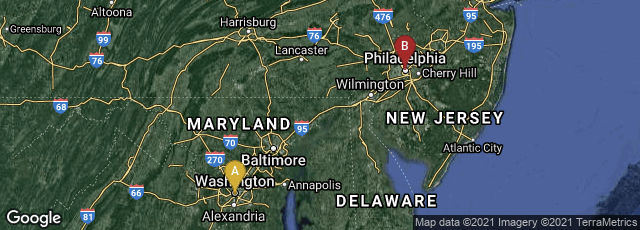

A: Washington, District of Columbia, United States, B: Philadelphia, Pennsylvania, United States
The first page of Lincoln's original Emancipation Proclamation declaring “that all persons held as slaves” within the rebellious areas “are, and henceforward shall be, free.” Lincoln’s bold step was a military measure by which he hoped to inspire the slaves in the Confederacy to support the Union cause. Because it was a military measure, the proclamation was limited in many ways. It applied only to states that had seceded from the Union, and left slavery untouched in the border states. Although the Emancipation Proclamation did not end slavery, it did fundamentally transform the character of the war. Henceforth, every advance of Federal troops expanded the domain of freedom. Moreover, the proclamation announced the acceptance of black men into the Union Army and Navy. By the end of the war, almost 200,000 black soldiers and sailors had fought for the Union and their own freedom. National Archives.
By executive order on January 1, 1863 President Abraham Lincoln issued the Emancipation Proclamation, the single most important act of his presidency.
The proclamation
"proclaimed the freedom of slaves in the ten states then in rebellion, thus applying to 3.1 million of the 4 million slaves in the U.S. at that time. The Proclamation immediately freed 50,000 slaves, with nearly all the rest (of the 3.1 million) freed as Union armies advanced. The Proclamation did not compensate the owners, did not itself outlaw slavery, and did not make the ex-slaves (called freedmen) citizens.
"On September 22, 1862, Lincoln issued a preliminary proclamation that he would order the emancipation of all slaves in any state of the Confederate States of America that did not return to Union control by January 1, 1863. None returned, and the order, signed and issued January 1, 1863, took effect except in locations where the Union had already mostly regained control. The Proclamation made abolition a central goal of the war (in addition to reunion), outraged white Southerners who envisioned a race war, angered some Northern Democrats, energized anti-slavery forces, and weakened forces in Europe that wanted to intervene to help the Confederacy. Slavery was made illegal everywhere in the U.S. by the Thirteenth Amendment, which took effect in December 1865" (Wikipedia article on Emancipation Proclamation, accessed 06-25-2012).
The original Emancipation Proclamation document is preserved in the U. S. National Archives; images of all 5 pages of the original manuscript are available from the National Archives website.
In 1864, in order to aid Union troops, an "Authorized Edition" of the Emancipation Proclamation was printed on one sheet, 17-1/4x 21-3/4 inches, on J. Whatman watermarked paper, and signed by Lincoln, Secretary of State William H. Seward, and John Nicolay, the President's private secretary. Copies were sold at the Philadelphia Great Central Fair in aid of the U.S. Sanitary Commission. Of the 48 copies signed by Lincoln, 26 were known to survive in 2012. On June 26, 2012 one of those copies was auctioned in New York City at Robert A. Siegel Galleries in association with Seth Kaller, Inc. The presale estimate was $1,800,000- $2,400,000; price realized was $1,850,000 plus premium or $2,100,000. A copy once owned by Robert Kennedy sold for $3.8 million in 2010.